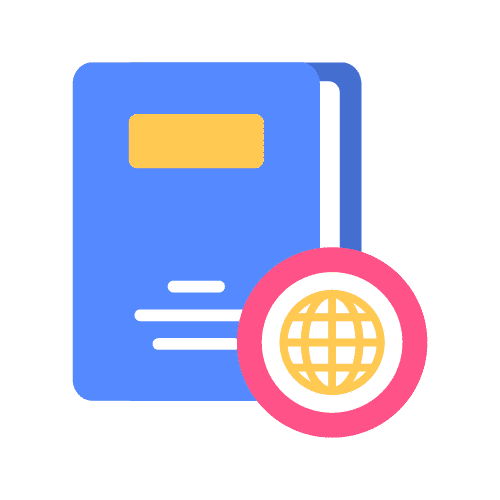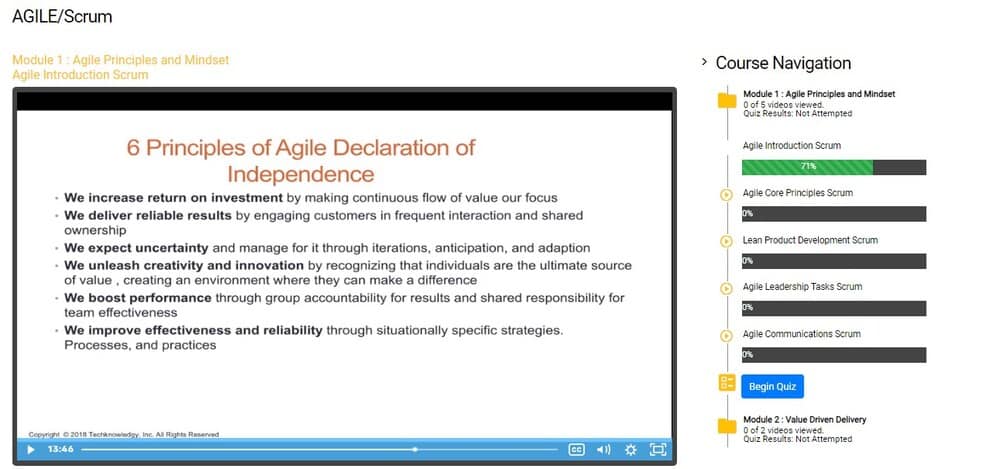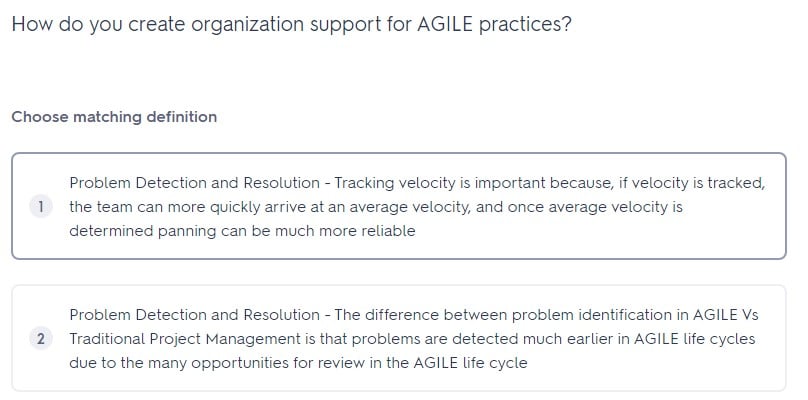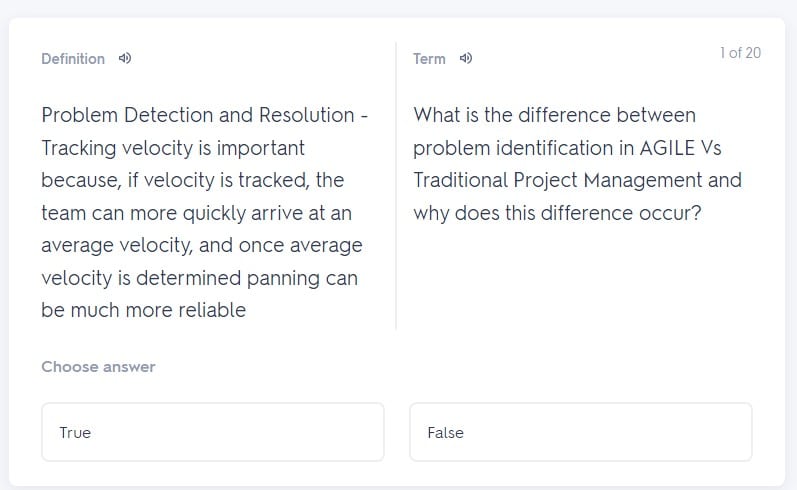Course Description:
Agile Scrum is a popular methodology used in software development and project management. It emphasizes collaboration, flexibility, and customer feedback to deliver high-quality products and services. Scrum teams work in short iterations or “sprints” to develop and deliver increments of the product, which allows for continuous feedback and improvement.
The Scrum framework includes several core elements, including ceremonies such as Sprint Planning, Daily Scrum, Sprint Review, and Sprint Retrospective. These ceremonies provide a structure for the team to collaborate, plan, and reflect on their work. The framework also includes artifacts such as Product Backlog, Sprint Backlog, and Increment, which provide transparency and visibility into the work being done.
The roles in the Scrum framework include the Scrum Master, Product Owner, and Development Team. The Scrum Master is responsible for facilitating the Scrum process and ensuring the team follows the framework. The Product Owner is responsible for representing the customer and prioritizing the work to be done. The Development Team is responsible for delivering the product increment.
By emphasizing communication, feedback, and a safe and courageous environment, the Scrum framework helps improve project performance and deliver value to customers quickly and efficiently. Completing an Agile Scrum training course can provide you with a deep understanding of the Scrum framework and its principles, as well as the skills to become an effective Scrum Master and lead a Scrum team.
This course includes 4 hours of training and 15 videos. Below are the different topics covered during the course:
- Agile Principles and Mindset – Knowing how to apply the principles of Scrum and accurately determining which projects are best suited for this methodology is crucial.
- Iterative approach
- Value Driven Delivery
- Stakeholder Engagement
- Team Performance – Establishing the ideal Scrum team is an achievable goal by following these foolproof best practices.
- Adaptive Planning
- Problem Detection and Resolution
- Continuous Improvement
- Ceremonies and artifacts are all essential to the success of a project. By properly utilizing these components in tandem with one another teams can effectively collaborate on projects that exceed expectations.
- A complete grasp of user stories and methods to order and control a product backlog are essential for success. Discovering ways to keep all levels of the organization informed on the Scrum team’s progress is a key factor for success. It’s essential that everyone in the company knows how far along the project has come, what milestones have been achieved, and which areas still need improvement. By keeping communication channels open across departments, organizations can maximize efficiency and effectiveness with their Scrum teams.
Course Outline:
Module 1: Agile Principles and Mindset
Agile Introduction Scrum
Agile Core Principles Scrum
Lean Product Development Scrum
Agile Leadership Tasks Scrum
Agile Communications Scrum
Module 2: Value-Driven Delivery
Value-Driven Delivery Scrum
Value Driven Delivery Scrum Part2
Module 3: Stakeholder Engagement
Stakeholder Engagement Scrum
Facilitation Tools Scrum
Module 4: Team Performance
Team Performance Scrum
Digital Tools for Distributed Teams Scrum
Module 5: Adaptive Planning
Adaptive Planning Scrum
Adaptive Planning Scrum Part2
Module 6: Problem Detection and Resolution
Problem Detection and Resolution Scrum
Module 7: Continuous Improvement
Continuous Improvement Scrum
Frequently Asked Questions about Agile/Scrum
What is Scrum Agile?
Scrum Agile is a popular project management framework used to effectively manage complex projects. It follows an iterative and incremental approach, allowing teams to deliver valuable product increments in shorter time frames. Scrum Agile emphasizes collaboration, adaptability, and transparency, enabling teams to respond to changing requirements and deliver high-quality outcomes.
How does Scrum Agile differ from traditional project management?
Scrum Agile differs from traditional project management methodologies by embracing flexibility and adaptability. Unlike traditional approaches that follow a sequential and predictive process, Scrum Agile focuses on iterative development and regular feedback loops. It encourages collaboration between team members and stakeholders, promotes continuous improvement, and allows for changes to be incorporated throughout the project’s lifespan.
What are the key roles in Scrum Agile?
Scrum Agile defines three key roles: the Product Owner, the Scrum Master, and the Development Team. The Product Owner represents the interests of stakeholders, ensures the product backlog is prioritized, and collaborates with the team. The Scrum Master facilitates the Scrum process, coaches the team, and helps remove any impediments. The Development Team consists of professionals who do the work of delivering the product increment, self-organize, and collaborate to achieve the project goals.
How does Scrum Agile handle project requirements?
Scrum Agile handles project requirements through a prioritized list called the product backlog. The Product Owner collaborates with stakeholders to gather and define requirements and then prioritizes them based on their value and importance. During each sprint, the Development Team selects a set of backlog items to work on and defines a plan to deliver them. The team continuously refines and adjusts the backlog as new insights emerge throughout the project.
What is a sprint in Scrum Agile?
In Scrum Agile, a sprint is a time-boxed iteration during which the Development Team works to deliver a potentially shippable product increment. Sprints are typically short, lasting between one to four weeks. At the beginning of each sprint, the team collaboratively plans the work to be done and defines a sprint goal. The Development Team then organizes and executes the work, holding daily stand-up meetings to synchronize their progress. At the end of the sprint, the team conducts a sprint review to gather feedback from stakeholders and a retrospective to reflect on their processes and identify improvements for the next sprint.
Can Scrum Agile be used for non-software projects?
Yes, Scrum Agile can be applied to various domains beyond software development. While it originated in the software industry, the principles and practices of Scrum Agile can be adapted to manage projects in marketing, sales, HR, and other non-software fields. The framework’s flexibility and focus on iterative development and collaboration make it suitable for managing projects in diverse industries.
Are there any certifications available for Scrum Agile?
Yes, there are certifications available to validate knowledge and expertise in Scrum Agile. The most recognized certification is the Certified ScrumMaster (CSM) offered by Scrum Alliance. Additionally, Scrum.org provides the Professional Scrum Master (PSM) certification, and the Project Management Institute (PMI) offers the Agile Certified Practitioner (PMI-ACP) certification. These certifications demonstrate an individual’s understanding of Scrum Agile principles, practices, and their ability to apply them effectively in project management scenarios.




